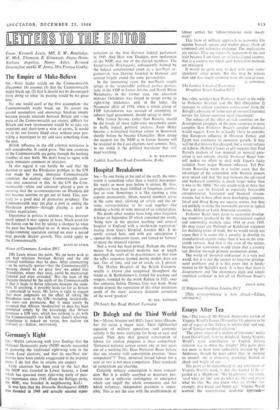The Empire of Make-Believe ME'rirEn5 911 UNE - E From: Kenneth
Lewis, MP, S. W. Routledge, W. McL. Thomson. E. GOnensay, Angus Hone, Barbara Aspeling, Henry Adler, Bernard Donoughue and G. W. Jones, Mrs Franya Godby.
Sta.—Your leader article on the Commonwealth (December 16) assumes (1) that the Commonwealth might break up; (2) that it should not be discouraged from doing so since 'its passing would be no great loss.'
No one would cavil at the first assumption—the Commonwealth might break up. To accept the second assumption and encourage breakup simply because present relations between Britain and some parts of the Commonwealth are uneasy, difficult for Britain and even inconvenient would be to take too impatient and short-term a view of events. It would be to let our history bleed away without even pro- viding a tourniquet to try and save something from the past.
British influence in the old colonial territories is still considerable. It could grow. The new countries of the Commonwealth are going through the teething troubles of new birth. We don't have to agree with every immature comment or initiative.
In this regard it can hardly be said that the decision to send the Rhodesian problem to the UN was made by young immature Commonwealth countries; the mature older Commonwealth coun- tries also concurred in this. At the UN the Com- monwealth—white and coloured—played a part in ensuring that the recommendations on Rhodesia did not become extreme or get out of hand. This, con- trary to a good deal of premature prophecy. The Commonwealth may yet play a part in ending the Rhodesian problem—through playing a part in further negotiations.
Impatience in politics is seldom a virtue, however much appeal it may appear to have. Much good for the future can be lost by taking a chopper to what the past has bequeathed to us. A more responsible hedge-trimming operation carried on over a period may provide thicker growth. This could apply to the Commonwealth.
[Mr Lewis misses the point. We no more wish to see bad relations between Britain and the old colonial territories than he does. After commenting —as he correctly quotes—that the Commonwealth's 'passing should be no great loss' we added that `friendships, where they exist, could be maintained, fostered and even extended.' Not the least of the illusions fostered by the myth of the Commonwealth is that it leads to better relations between the mem- bers. If anything, it possibly leads (as far as Britain is concerned) to worst. Mr Lewis is right to suggest that most judgments on the effect of taking the Rhodesian issue to the UN—including, incidentally, his own—are premature. But it must surely be accepted that African `moderation' to date has been prompted simply by the knowledge that Britain possesses a UN veto, which has nothing to do with the Commonwealth (no UK veto there!) whatever. Impatience is indeed no virtue, but realism (in politics) is.—Editor, SPECTATOR].






























 Previous page
Previous page